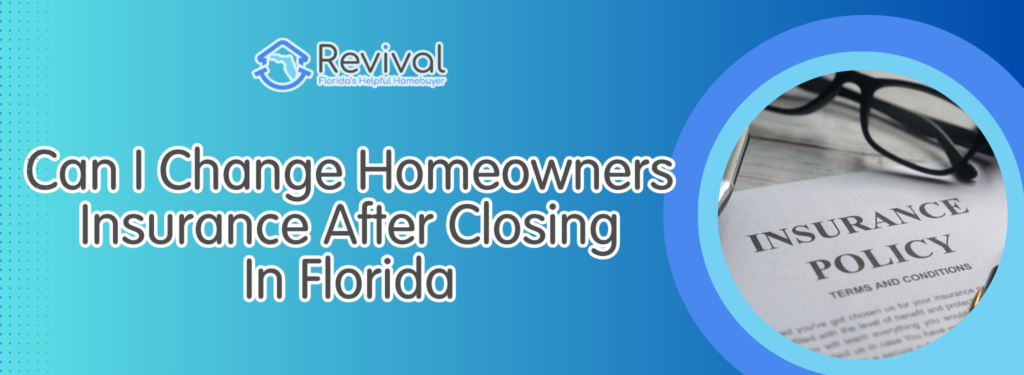
Can I Change Homeowners Insurance After Closing in Florida?
As long as you live in Florida, you can change your home insurance after the close. Now you can choose a different policy if it better fits your wants or has better rates.
How Soon Can I Switch After Closing?

If you want to, you can switch your home insurance right after the close. To make the move go smoothly, do these things:
- Check the effective date: Make sure your new policy starts before canceling the old one.
- Know the requirements: Your mortgage lender might have rules for changing insurance.
- Follow the process steps: Contact your new insurance provider and let your lender know about the change.
What Factors Affect the Timing of My Insurance Change?
Several things can affect when you can change your homeowners insurance:
- Mortgage lender: Lenders may need to know or approve before you switch your policy.
- You will need to work with your lender to make payments if you pay your insurance through a trust account.
- Policy terms: Check your current policy terms to avoid penalties or gaps in coverage.
Are There Penalties for Switching Too Quickly?
Switching homeowners insurance too quickly in Florida could mean:
- Fees: Some insurers might charge a cancellation fee, but this can vary.
- Compliance issues: Make sure your new policy meets lender requirements to avoid problems.
- Regulation checks: Confirm you are following state rules for insurance changes.
For more help and to meet all necessary requirements, contact Revival Home Buyer or speak with insurance professionals.
What Documents Do I Need to Change My Florida Homeowners Insurance?
If you want to change your homeowners insurance in Florida, you’ll need some key documents. These make the process easier:

- Current Insurance Policy: Keep a copy of your current homeowners insurance policy on hand.
- Property Details: Have your property address and any recent appraisals or inspections ready.
- Mortgage Information: Know your mortgage lender’s details, including the loan number.
- Closing Documents: These prove ownership and give loan details.
Having these documents ready will help when updating your insurance.
Notifying My Mortgage Lender About the Change
It’s important to tell your mortgage lender when you change your homeowners insurance. Here’s what to do:
- Contact Your Lender: Let them know you’re switching insurance policies.
- Provide New Policy Details: Give them the new policy info, including provider and coverage.
- Update Escrow Account: If you pay your insurance through an escrow account, ask your lender to update it with the new policy.
Talking with your lender quickly helps avoid issues with your loan or escrow account.
Information to Provide My New Insurance Provider
When you switch to a new insurance provider in Florida, you’ll need to share some information:
- Current Policy Details: Have your existing policy’s details for reference.
- Property Information: Share the property address and any changes or renovations you’ve made.
- Coverage Needs: Explain what coverage you are looking for in the new policy.
Giving accurate information helps your new insurer find the best coverage for you.
What if I Can’t Find My Closing Documents?
If you can’t find your closing documents, don’t worry. Try these steps:
- Check with Your Lender: Your mortgage lender likely has copies of your closing documents.
- Contact Your Title Company: They might have records of your closing papers.
- Request Duplicate Copies: Both lenders and title companies can often provide duplicates if needed.
These documents are helpful in managing your homeowners insurance effectively.
How to Compare Homeowners Insurance Providers in Florida
In Florida, it’s smart to look at more than one company when you’re looking for home insurance. This helps you get the best service. How to do it:

- Look at Coverage Options: Make sure the policy covers what you need. This includes protection against natural disasters common in Florida.
- Consider Costs and Premiums: Compare rates from different insurers to find a premium that fits your budget.
- Evaluate Company Reputation: Choose reliable and reputable providers by checking reviews and ratings online.
- Check Provider Licenses: Verify that the insurance provider is licensed to operate in Florida.
Key Factors to Consider When Comparing Quotes
When you’re looking at insurance quotes, focus on these factors:
- Premiums and Deductibles: Understand what you’ll pay upfront and if you file a claim.
- Policy Coverage: Make sure the policy includes important coverages like windstorm and flood insurance.
- Cost vs. Benefits: Think about whether the benefits are worth the cost.
- Insurance Company’s Background: Research the company’s history and financial stability.
Resources for Comparing Florida Insurance Options
You can use these resources to help you make a good decision:
- State Insurance Department Website: It provides information on licensed providers in Florida.
- Online Comparison Tools: Websites like NerdWallet or Policygenius help you compare different policies.
- Consult a Local Insurance Agent: They can offer advice and help you understand your options.
Questions to Ask Potential Insurance Providers
Before you pick an insurance provider, ask them these questions:
- What Does the Policy Cover?: Make sure it meets your home protection needs.
- How Are Claims Handled?: Knowing how claims are processed can tell you about their service reliability.
- What Discounts Are Available?: Ask about discounts for home safety features or combined policies.
- What Is Your Reputation?: Check online reviews or ask for references to see if they are trustworthy.
By following these guidelines, you can make informed choices when selecting insurance providers. Always make sure your chosen policy meets your needs and protects your home well.
Steps to Change My Homeowners Insurance After Closing
It can be easy to change your Florida home insurance after the deal is done. Just follow these steps, and it will go well.
Canceling My Existing Policy
To cancel your existing homeowners insurance policy, you need to:

- Contact Your Insurance Company: Let your current insurer know you want to cancel the policy.
- Provide Notice: Many companies ask for a written notice. Check what your policy needs.
- Effective Date: Pick a cancellation date that matches when your new coverage starts to avoid gaps.
- Cancellation Process: Confirm if there are any fees or refunds for unused premiums.
Obtaining Coverage from a New Provider
Getting a new homeowners insurance policy involves:
- Compare Quotes: Ask different insurance companies for quotes. This helps you find the best deals and options.
- Select a Policy: Read the terms carefully before choosing your new provider.
- Ensure Continuous Coverage: Set the start date for the new policy to match your old policy’s cancellation date.
Addressing Potential Gaps in Coverage
To make sure there are no gaps in your homeowners insurance coverage, you should:
- Review Policy Details: Ensure your new policy offers enough protection and covers everything at risk.
- Check Coverage Limits: Make sure the liability coverage fits your needs. Adjust if needed for full protection.
- Continuous Coverage: Double-check that there’s no break between your old policy and the new one.
- Understand Your Risks: Know any possible risks or liabilities during the switch and deal with them ahead of time.
If you do these things, it will be easy to switch to a new home insurance policy. Talk to a professional if you need help or have questions about how to keep your Florida home safe.
Costs Associated with Changing Homeowners Insurance
Changing homeowners insurance can affect your finances in many ways. Knowing these costs helps you make smart decisions and possibly save money.
Fees for Switching Providers
Switching your insurance provider might come with fees. Here are some possible costs:

- Administrative Costs: Some insurance companies may charge fees when you move your policy to a new provider.
- Cancellation Fees: If you cancel your current policy early, there might be cancellation fees. Check your contract for any penalties.
- Transfer Fees: Changing policies between providers can sometimes include extra charges.
Always read your existing policy or speak with a representative to know all potential financial impacts.
Comparing Costs of New vs. Old Policies
Before switching policies, compare the costs and benefits of your old and new policies:
- Premiums: Compare the monthly or annual premium amounts. A lower premium doesn’t always mean better coverage.
- Coverage: Make sure the new policy provides the same or better coverage than your current one.
- Deductibles: Compare deductibles since they affect your out-of-pocket costs when you file a claim.
- Benefits and Options: Check out other benefits, like discounts or added features, that each policy offers.
By looking at these factors, you can decide which policy gives you the best value.
Potential Increases or Decreases in Premiums
Switching insurance might change your premiums in various ways. Here’s what to think about:
- Rate Changes: Insurers may adjust rates based on market changes or risk assessments.
- Discounts: Some providers offer discounts for home safety features or bundled insurance packages.
- Home Value and Location: Changes in your home’s value or location can also impact your premium.
- Negotiation: Always try to negotiate with your insurer for potential discounts or better rates.
Knowing these factors can help you figure out if your premiums will go up or down with a new policy.
By checking these costs and benefits carefully, you can make a smart choice about switching your homeowners insurance. For more help, Revival Home Buyer can give you resources to guide you through the process.
Can I change home insurance after closing on a home in Florida?
You can change your home insurance after the deal is done, even in Florida. Make sure the new insurance starts before the old one ends so that you don’t have any coverage gaps.
What should I consider before changing homeowners insurance in Florida?
When switching insurance, think about these things:
- Coverage Needs: Check if the new policy meets all your needs.
- Mortgagee Clause: Update this with your lender.
- Cost: Compare prices, deductibles, and look for discounts.
How do I update my mortgage servicer when I change insurance?
Tell your mortgage servicer about the change by giving them a copy of your new policy. This helps them keep their records correct.
Are there special considerations for home insurance in Florida?
Florida homeowners should consider:
- Hurricane Coverage: Make sure you have wind or hurricane-related coverage.
- Flood Insurance: You might need separate flood insurance if it’s not included.
What are some reliable home insurance options in Florida?
Discover dependable businesses like OpenHouse Home Insurance or Grange Insurance. Check that the business has a Florida license and read reviews from past customers to see how reliable they are.
Can changing home insurance impact my home equity loan?
Changing home insurance usually doesn’t affect your home equity loan directly. Just make sure your property is fully insured as your lender requires.
How do fire safety measures affect my home insurance in Florida?
Having things like smoke detectors and fire-resistant materials can lower your insurance premiums because they reduce risk.
What steps should I take for vacant home insurance in Florida?
If your home will be empty for a while, let your insurer know so they can adjust your policy. This helps manage risks for unoccupied homes.
Can I Change Homeowners Insurance After Closing in Florida?
In Florida, you can change your home insurance after the deal is done. You should know what to do and how the process works.
Key Insights
- Changing Homeowners Insurance: You can change your insurance policy even after your home purchase is complete. Contact your new provider and explore different Florida insurance options.
- Considerations for Changing Insurance: Before switching, review your current policy details like coverage and renewal terms. Compare them with other reputable companies to find the best fit.
- Informing Your Mortgage Servicer: Let your mortgage servicer know about any changes to ensure everything is okay with your mortgage agreement. They care about your policy through the mortgagee clause.
- Insurance and Escrow Accounts: If your premiums are paid through an escrow account, notify your escrow agent about any updates to avoid payment issues.
- Exploring Homeowners Policy Options in Florida: Look into various insurance options by researching licensed agents and brokers in Florida for affordable and reliable policies.
- Costs: When you’re looking for a new policy, think about things like how much your home would cost to rebuild, its fire safety features, and the chance of natural disasters like wildfires.
- Legal Compliance: Make sure your new policy follows Florida’s insurance laws. Knowing the rules can help you avoid future problems.
- Assessing Risks and Coverage: Check what risks your home might face and make sure your policy covers valuable items.
- Documentation: Write down everything you know about your new agreement, including any reports or statements from your new insurance company.
- Impact on Mortgage Agreement: Be aware that changing your policy could affect your mortgage, like interest rates or terms.
- FAQs and Resources: Use resources and guides to answer questions about changing insurance, so you make smart decisions.
- Getting Professional Help: Talk to expert insurance agents in Florida who can offer advice and guide you through the process.
These insights are relevant across Florida, including cities like Brandon, Clearwater, St. Petersburg, Tampa, and surrounding areas. For more help, Contact Us at (813) 548-3674.
More Resources To Help Sell A Florida House


